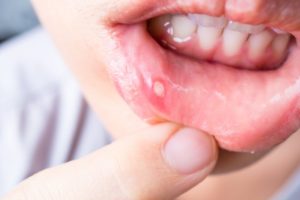
Have you ever experienced a painful red bump on the inside of your mouth or on your lips? What you likely had was a canker sore or cold sore. These mouth sores are incredibly common all across the country, but are not often talked about. Let’s take a closer look at the differences between cold sores and canker sores, including what causes them. From there, we can review the most effective way to treat and prevent them!
Cold Sores Vs Canker Sores: What’s the Difference?
Canker sores are very common and often recur. These slightly swollen sores are usually round or oval-shaped and are typically white in color and surrounded by a bright red color. They aren’t contagious and they only form inside the mouth on the soft tissues.
Cold sores are often confused with canker sores. These painful, fluid-filled blisters are sometimes called fever blisters or herpes simplex and form around the outside of the mouth, such as on the lips, under the nose, or around the chin. They most commonly occur in childhood and are very contagious.
The Top Causes of Mouth Sores
Researchers are still unclear as to what exactly causes canker sores, but many believe that immune system problems or bacteria are involved. The most common factors that trigger canker sores are:
- Injury or cut to the inside of the mouth
- B-12, iron, or folate vitamin deficiency
- Stress or fluctuations in hormones
- A reaction to chocolate, spicy foods, or sodium lauryl sulfate
- Lupus, inflammatory bowel diseases, and other immune system problems
On the other hand, it is confirmed that cold sores are the result of a type of herpes virus. This virus is very contagious and can be spread through activities such as sharing eating utensils or kissing. Once the infection has been contracted, cold sores can be caused by:
- Stress or fatigue
- Being sick with the flu or a cold
- Exposure to sunlight
- Changes in hormones
- Irritation to the tissues around your mouth
How to Prevent & Treat Canker Sores & Cold Sores
Thankfully, both cold sores and canker sores typically heal on their own in about a week. However, since canker sores often reoccur and there is no cure for the infection that causes cold sores, it’s a good idea to know how to handle these uncomfortable lesions. Great oral hygiene, staying hydrated, and regularly visiting your dentist can help keep your mouth clean, which can help prevent and treat mouth sores. Non-prescription topical anesthetics, pain relievers, and mouthwashes can also help. In some cases, you may need to visit your dentist or physician to see if prescription antiviral drugs or antibiotics are needed.
About the Practice
Our talented and experienced team here at Pinnacle Dental is dedicated to keeping smiles of all ages in Braintree happy and healthy for life. Every personalized treatment plan starts with preventive dentistry to keep issues like cavities, gum disease, and mouth sores from causing problems in the first place. Should you notice any bothersome canker or cold sores that are concerning or distressing you, don’t hesitate to get in touch with us and we’ll be happy to help. To learn more, we can be reached online or at (781) 843-7905.
